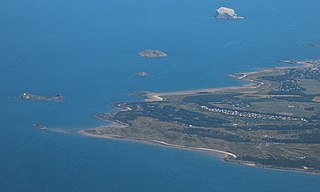
The Bass Rock, or simply the Bass, is an island in the outer part of the Firth of Forth in the east of Scotland. Approximately 2 kilometres (1 mi) offshore, and 5 kilometres (3 mi) north-east of North Berwick, it is a steep-sided volcanic rock, 107 metres (351 ft) at its highest point, and is home to a large colony of gannets. The rock is uninhabited, but historically has been settled by an early Christian hermit, and later was the site of an important castle, which after the Commonwealth period was used as a prison. The island belongs to Hew Hamilton-Dalrymple, whose family acquired it in 1706, and before to the Lauder family for almost six centuries. The Bass Rock Lighthouse was constructed on the rock in 1902, and the remains of an ancient chapel survive.

Cujo is a 1981 psychological horror novel by American writer Stephen King about a rabid Saint Bernard. The novel won the British Fantasy Award in 1982 and was made into a film in 1983.
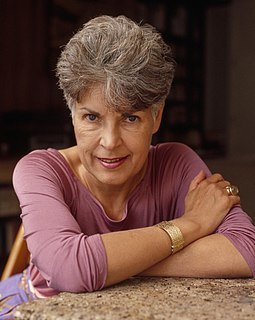
Ruth Barbara Rendell, Baroness Rendell of Babergh, was an English author of thrillers and psychological murder mysteries.
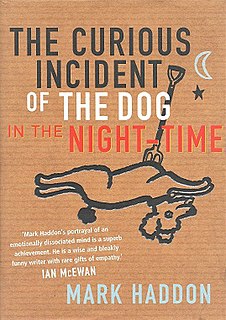
The Curious Incident of the Dog in the Night-Time is a 2001 mystery novel by British writer Mark Haddon. Its title refers to an observation by the fictional detective Sherlock Holmes in the 1892 short story "The Adventure of Silver Blaze". Haddon and The Curious Incident won the Whitbread Book Awards for Best Novel and Book of the Year, the Commonwealth Writers' Prize for Best First Book, and the Guardian Children's Fiction Prize. Unusually, it was published simultaneously in separate editions for adults and children.

The Transgender Day of Remembrance (TDoR), also known as the International Transgender Day of Remembrance, has been observed annually on November 20 as a day to memorialize those who have been murdered as a result of transphobia. The day was founded to draw attention to the continued violence endured by transgender people.
Reverse chronology is a narrative structure and method of storytelling whereby the plot is revealed in reverse order.
Pauline Melville FRSL is an English/Guyanese-born writer and former actor of mixed European and Amerindian ancestry, who is currently based in London, England. Among awards she has received for her writing – which encompasses short stories, novels and essays – are the Commonwealth Writers' Prize, the Guardian Fiction Prize, the Whitbread First Novel Award, and the Guyana Prize for Literature. Salman Rushdie has said: "I believe her to be one of the few genuinely original writers to emerge in recent years."

The Watsons Go to Birmingham – 1963 is a historical-fiction novel by Christopher Paul Curtis. First published in 1995 by Delacorte Press, it was reprinted in 1997. It tells the story of an African-American family living in the town of Flint, Michigan, in 1963, during the height of the Civil Rights Movement. When Byron, the oldest son, begins to misbehave, the parents decide he should spend the summer — and possibly the next school year — with his grandmother in Birmingham, Alabama. The entire family travels south by car, and during their visit, tragic events occur.
Margot Livesey is a Scottish-born writer. She is the author of nine novels, a collection of short stories, a collection of essays on writing and the co-author, with Lynn Klamkin, of a textbook. Among other awards, she has earned a Guggenheim Fellowship, a National Endowment for the Arts Fellowship, the PEN New England Award, and the Massachusetts Book Award.
Evelyn Rose Strange "Evie" Wyld is an Anglo-Australian author. Her first novel, After the Fire, A Still Small Voice, won the John Llewellyn Rhys Prize in 2009, and her second novel, All the Birds, Singing, won the Encore Award in 2013 and the Miles Franklin Award in 2014. Her third novel, The Bass Rock, won the Stella Prize in 2021.

After the Fire, A Still Small Voice is the debut novel by author Evie Wyld published in August 2009 by Jonathan Cape in the UK and Pantheon Books in the US. It won the John Llewellyn Rhys Prize and a Betty Trask Award. and was also shortlisted for both the Orange Award for New Writers and International Dublin Literary Award.
The Stella Prize is an Australian annual literary award established in 2013 for writing by Australian women in all genres, worth $50,000. It was originally proposed by Australian women writers and publishers in 2011, modelled on the UK's Baileys Women's Prize for Fiction.

Vanessa Veselka is an American writer best known for her 2020 novel The Great Offshore Grounds, which won the Oregon Book Award and was longlisted for the U.S. National Book Award. She is also the author of the PEN / Robert W. Bingham prize prize-winning novel Zazen, and her nonfiction has appeared in Salon, The Atlantic, GQ, Maximum Rock'n'Roll, Bitch Magazine, Smithsonian, The Atavist, and The American Reader.

A Tale for the Time Being is a metafictional novel by Ruth Ozeki narrated by two characters, a sixteen-year-old Japanese American girl living in Tokyo who keeps a diary, and a Japanese American writer living on an island off the coast of British Columbia who finds the diary of the young woman washed ashore some time after the 2011 tsunami that devastated Japan.

The Echo Chamber is the debut novel of Scottish author Luke Williams, published in 2011. The Saltire Society awarded it the Scottish First Book of the Year prize that year. As revealed in the books acknowledgements, two of the chapters, extracts from the diary of Damaris a young woman and Evie's first lover were written by a friend, Natasha Soobramanien.
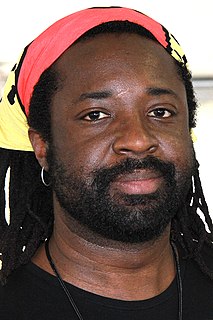
Marlon James is a Jamaican writer. He is the author of five novels: John Crow's Devil (2005), The Book of Night Women (2009), A Brief History of Seven Killings (2014), which won him the 2015 Man Booker Prize, Black Leopard, Red Wolf (2019), and Moon Witch, Spider King (2022). Now living in Minneapolis, Minnesota, in the U.S., James teaches literature at Macalester College in St. Paul, Minnesota. He is also a faculty lecturer at St. Francis College's Low Residency MFA in Creative Writing.
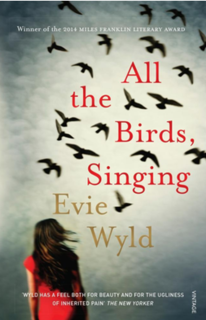
All the Birds, Singing is a 2013 novel by Australian author Evie Wyld. It won the 2014 Miles Franklin Award and the 2014 Encore Award.

The Girl on the Train is a 2015 psychological thriller novel by British author Paula Hawkins that gives narratives from three different women about relationship troubles and, for the main protagonist, alcoholism. The novel debuted in the number one spot on The New York Times Fiction Best Sellers of 2015 list dated 1 February 2015, and remained in the top position for 13 consecutive weeks, until April 2015. In January 2016 it became the #1 best-seller again for two weeks. Many reviews referred to the book as "the next Gone Girl", referring to a popular 2012 psychological mystery, by author Gillian Flynn, with similar themes that used unreliable narrators.
Camryn Garrett is an American writer. Her work has appeared in outlets such as Rookie and MTV. She published her first novel, Full Disclosure, in 2019.

Shuggie Bain is the debut novel by Scottish-American writer Douglas Stuart, published in 2020. It tells the story of the youngest of three children, Shuggie, growing up with his alcoholic mother Agnes in 1980s post-industrial working-class Glasgow.














